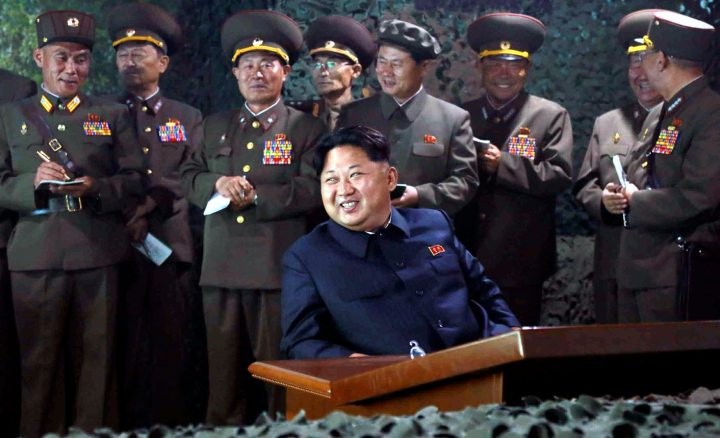World
North Korea: Beyond the Six-Party Talks

The Six-Party Talks were established in 2003 as a multilateral forum to achieve the denuclearisation of the Korean peninsula. However, the parties (China, Japan, North Korea, Russia, South Korea and the US) have not met since December 2008, when the talks stalled over verification issues. The new channels of engagement are needed to further incremental change in North Korean society. By the INTERNATIONAL CRISIS GROUP.
There is a strong international consensus that North Korea (Democratic People’s Republic of Korea, DPRK) should comply with UN Security Council resolutions and abandon its nuclear weapons programme but there is widespread disagreement over the strategy and policies for achieving this. Nuclear arms are now an integral part of North Korea’s national identity so it is increasingly apparent that in the absence of a sea change in ideology or leadership in Pyongyang, the Six-Party Talks will not achieve their central aim.
Though governments need to keep up pressure for disarmament and maintain the dynamics of the current containment and deterrence policy, they also should establish – and encourage other international actors to establish – new channels of engagement that may further incremental change in North Korean society.
Since the end of the Cold War, the DPRK has developed a state ideology of s?n’gun (‘military first’). Furthermore, the third generation of Kim family rule has adopted the py?ngjin line, calling for simultaneous economic and nuclear technology development for both peaceful and military purposes, as Kim Jong-un’s contribution to “scientific socialist thought” and essential to the continuing Korean revolution. Nuclear status has been enshrined in the constitution and statutes, and state propaganda emphasises the role of nuclear weapons, satellite launchers and nuclear technology in the nation’s modernisation and prosperity.
DPRK officials often have repeated that Pyongyang will denuclearise when the rest of the world does. Denuclearisation would require a transformation of that identity, in effect revolutionary change. The North has offered to return to the Six-Party Talks “without preconditions” to discuss regional security, nuclear disarmament and other issues – but not denuclearisation.
South Korea (ROK) faces an existential threat from the North’s growing nuclear arsenal. It is divided, however, over policy toward Pyongyang. After activity was detected around the nuclear test site at Punggye-ri in spring 2014, it invested considerable effort in an attempt to restart the Six-Party Talks. By late February 2015, five parties had reached a consensus on the minimum criteria to present to Pyongyang. To test intentions and sincerity on denuclearisation, Seoul has pushed for “exploratory talks” in a track two setting as a first step toward resuming the formal six-party process. If Pyongyang does not meet the criteria for resumption, which have not been disclosed publicly, the US, South Korea and others appear poised to take increasingly punitive measures.
There is little likelihood the US would enter resumed talks unless there is a much greater prospect than appears to exist that they would be pursued in good faith by the North and not simply used for manipulation and propaganda. Experience under the agreed framework in the 1990s, in addition to widespread perception that the DPRK is unreliable, make the Obama administration, and almost certainly any future president, sensitive to likely domestic blowback from another failed diplomatic effort with Pyongyang. China does not face the same domestic risks if the talks were to restart and turn out badly. It could always take credit for hosting them, and in the case of failure, blame the DPRK and/or the US Its consistent position has been to restart dialogue even with low likelihood for success.
Japan also has a high threat perception regarding the North’s nuclear and missile programs and generally will support South Korea and the US over the talks. Bilateral discussion of Japanese citizens kidnapped by North Korean agents in the 1970s and 1980s raised hopes for improved relations, but that process also has stalled. Without a satisfactory resolution on abductions, Tokyo will be even more inclined to take a harder line on the nuclear issue. Russia wants the talks to resume as soon as possible. Though sensitive about Pyongyang’s nuclear and missile activities, it believes Washington exaggerates the threat, and its focus is on economic co-operation, which the North welcomes as helping reduce economic dependence on Beijing.
Whether or not an intended exploratory meeting is held, the gap between positions is too broad to expect the Six-Party Talks to resume as a good-faith effort to denuclearise the peninsula. For that, either the DPRK must abandon its nuclear identity and ambitions, or the international community must accept transformation of the talks into a different type of institution that does not address denuclearisation of the Korean peninsula. Neither seems possible, so deterrence and containment will remain fundamental for dealing with a nuclear North.
Deterrence is imperfect and could fail, but it will remain a pillar of security in the Korean peninsula for the foreseeable future. At the same time, it needs to be complemented by a broader engagement with North Korea on a range of issues. The self-imposed isolation of Pyongyang perpetuates a dangerous regime, in the same way the US isolation of Cuba may have delayed evolutions in the Caribbean island; every opportunity should be seized to encourage an opening of society in North Korea.
Three sets of actors might do so: governments and inter-governmental organisations (IGOs); private sector firms; and civil society. The roles, risks, opportunities and costs vary, and engagement must be assessed on a case-by-case basis. Only governments can sign treaties, impose and lift economic sanctions or change a military posture. Businesses can trade and invest, creating opportunities for contacts and engagement, but unconstrained trade can lead to dangerous technology transfers.
A relevant segment of civil society activities includes educational, cultural, artistic, musical, scientific and sports exchanges. There is no true North Korean civil society activity, but outside non-governmental organisations (NGOs), while they cannot substitute for governments or economic actors, could be important for transmitting ideas and information into the North, which ultimately is necessary to change its thinking, identity and policies. DM
Photo: A picture released by the Rodong Sinmun, the newspaper of the North Korea ruling Workers Party, on 16 June 2015 shows North Korean leader Kim Jong-un (C), surrounded by senior military officials, observing a nighttime firing drill of a navy warship sub-unit and ground artillery sub-units at an undisclosed location in North Korea.The report, which failed to specify when the drill was conducted, came one day after North Korea said it is ready to hold talks with South Korea if certain preconditions are met, including the suspension of Seoul’s joint military drills with the United States. EPA/Rodong Sinmun
Read more:
-
Recommendations by the International Crisis Group
















 Become an Insider
Become an Insider